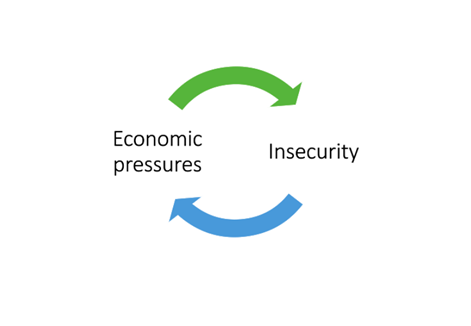By Ifetayo Idowu | The emergence of one or more forms of insecurity in nearly every region of Nigeria has pushed those regions to the frontlines of conflicts. Terrorism, herder-farmer conflicts, and ethnoreligious conflicts are all present in the North-Central and North-West regions of the country. In the North-East, Boko Haram and its affiliates are a constant thorn in the side. Militancy and economic sabotage are still present in the South-South, while ritual killings, cultism, and herder-farmer conflicts are prevalent in the South-West. In the South-East, the Eastern Security Network (ESN), the armed wing of the Indigenous People of Biafra (IPOB), continues to cause death and mayhem.
Agora Policy has just released its second and most recent report, focusing on widespread insecurity on the country. Titled "Understanding and Tackling Insecurity in Nigeria,” the report examines the history, types drivers and manifestations of insecurity in Nigeria, and provides recommendations for a systemic and sustainable solution.

Impact of the Economy on Insecurity
Examining the background of the country's most prominent security issues, the report highlights how poverty and unemployment create an environment conducive to the growth of insecurity. The report states that “high incidence of poverty and unemployment expands the pool of possible recruits for criminal activities.”
In Nigeria, 39.1% of the population lives below the international poverty line of $1.90 per person per day, and an additional 31.9% have consumption levels between $1.90 and $3.20, making them susceptible to poverty in the event of even the smallest of shocks. An earlier report on the economy published by Agora Policy reported that poverty is more prevalent in rural areas, with 52% of the rural population living in poverty and with people employed in the agrarian sector more susceptible to poverty than those employed in any other sector of the economy. Based on population projections for 20211, this equates to 49,947,644 rural dwellers living in poverty.
Unemployment rate is 33.3%; while youth unemployment is 42.49%. This figure shows that almost half of Nigeria’s most productive group is economically inactive. Unemployment causes large drops in household income. In some cases, unemployment is transitory but, for many, it is a persistent risk to economic security. Unfortunately, Nigeria’s high population growth rate increases poverty and decreases employment opportunities, which in turn increases poverty. These high numbers make people more susceptible to engage in criminal activities.
Furthermore, even though insecurity is one of the results of economic pressures among Nigerians, it has also become a threat to the well-being of the same citizens. In Nigeria, insecurity is both a cause and an effect of low economic development.
Impact of the Insecurity on the economy
On October 23rd, 2022 the United States issued a security alert citing “elevated risk of terror attacks’ in parts of the country, especially the FCT. Other western nations followed suit. This subsequently led to the precautionary and temporary closure of schools, recreation centers, restaurants and other businesses. This incident shows one of the direct connections between insecurity and economic activities. Insecurity reduces economic activity, reduces revenue and fuels poverty.
Food Inflation and Banditry
Food inflation in Nigeria keeps worsening as insecurity keeps farmers away from their farms. In September 2022, food inflation in the country rose to 23.34% on a year-on-year basis. The North-West and North-Central regions of the country are responsible for the bulk of Nigeria’s food production, and these places are heavily impacted by insecurity. The fear of being kidnapped stops farmers from going to their farms, distorting planting and harvesting cycles. In other areas, farmers are paying bandits to cultivate their farms, directly affecting the quantity of food they can produce. Others, after their labour have abandoned their harvests. In the same vein, terrorists and bandits are known to raid markets for food, animals and cash to feed themselves and finance their operations. According to the National President of the All Farmers’ Association of Nigeria, the country loses 50 per cent of its food production due to insecurity. A lot of Nigeria's food shortage is caused by insecurity, which in turn makes food inflation go up.
Food transportation from the North to the other parts of the country is also an issue as food transporters face the same security challenges. Travelling across the country by road is no longer a safe option and drivers and traders are in constant fear of being kidnapped. The challenges leave farmers and their families vulnerable to poverty and hunger but this also has implications for food prices and cost of living across the country.
Economic Sabotage in the South East and South South
In the South-East, August marked exactly one year since the Eastern Security Network declared every Monday a stay-at-home holiday. The eastern part of the country, renowned for commerce, is greatly affected as no economic activity takes place on Mondays in the zone. Businesses are crumbling under the weight of this order as even customers travel to safer areas to trade. Recently, Governor Chukwuma Soludo, an economics professor and former CBN governor, stated that his state, Anambra, loses N19.6 billion every Monday due to the sit-at-home order.
Militancy, manifested in oil-theft, pipeline vandalism, piracy, illegal bunkering, kidnapping of expatriates in the Niger-Delta region has a far-reaching impact on the national economy. The Agora Policy report states;
“ apart from being largely responsible for the insecurity in the region and Nigeria's current acute energy supply crisis, militancy discourages foreign investment in new power generation plants in the Niger Delta region”.
The Nigeria Extractive Industries Transparency Initiative (NEITI), also reported that about $42 billion was lost to oil theft and sabotage over a ten-year period. Nigeria is the only oil-producing country not reaping benefits from the current historically high oil prices. Nigeria cannot even meet its reduced OPEC quota partly because of high level of oil theft.
Rural areas across the country are now characterised by ungoverned spaces and economic activities are restricted. Insecurity affects every sector of the economy either directly or indirectly, it leads to forced migration, displacement, food insecurity, cattle rustling, destruction of poverty and health challenges. It affects people's access to resources, incomes and freedom. Insecurity has a negative impact on economic growth by drying up investments, increasing unemployment, and decreasing government revenue.
In 2020, the Global Terrorism Index reported that economic cost of terrorism to Nigeria was 2.4% of the country’s GDP. The report also states that Nigeria incurred the largest economic impact of terrorism in the world from 2007-2019 at $142 billion.2 In 2021, Town Talk Solutions reported that projects worth N12 trillion were abandoned across the country due to insecurity. These figures have implications for job creation, government allocations and investments, purchasing power and confidence of citizens, and the country’s fight against poverty.
Recommendations in addressing Nigeria’s Security Challenges
According to the Agora Policy report on insecurity, "to stand a fighting chance in overcoming widespread and growing insecurity within its borders, the country [Nigeria] needs to adopt a more holistic approach that effectively combines tackling security threats with addressing the root causes of conflicts and agitation." Economic pressures, which fuel insecurity in Nigeria and are a challenge in and of themselves, need attention from the government. If not addressed, unemployment, particularly high youth unemployment, could exacerbate societal and security issues. In a previous report titled ``Options for Revamping the Nigerian Economy" Agora Policy made the following recommendations for improving the welfare of Nigerian citizens to reduce the economic burdens they bear:
- Prioritizing and Fine-tuning job creation strategies
- Deepening investment in critical infrastructure
- Scaling-up investment in education
- Increasing coordination across tiers of government on poverty alleviation.
Due to the complexity of the problems confronting Nigeria, the government cannot afford to address the problems in isolation. The relationship between insecurity and economic pressures makes it difficult to effectively address one issue without addressing the other. The nature of both challenges is also such they cannot not be deferred. They have to be tackled quickly and simultaneously.
*Idowu is Data/Policy Analyst at Agora Policy
Footnotes
[1]https://data.worldbank.org/indicator/SP.RUR.TOTL?locations=NG
[2] https://visionofhumanity.org/wp-content/uploads/2020/11/GTI-2020-web-1.pdf





